Glamorous, Italian film actress Rosanna Schiaffino (1938-2009) was a show business icon of the 1960s, famous for her eye-catching legs and her temperamental performances. She appeared frequently in sword-and-sandal films, and on covers of European and American magazines.
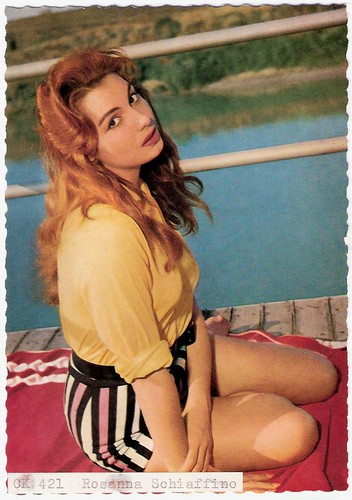
German postcard by Ufa, no. CK 421. Photo: Georg Michalke.
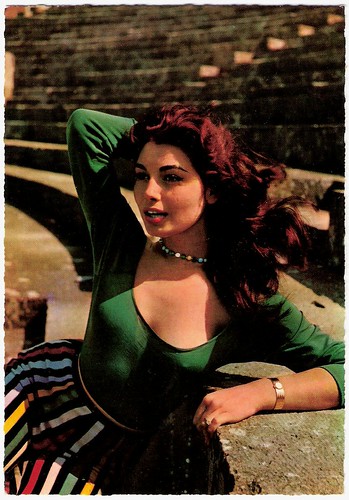
German postcard by Krüger, no. 902/59.
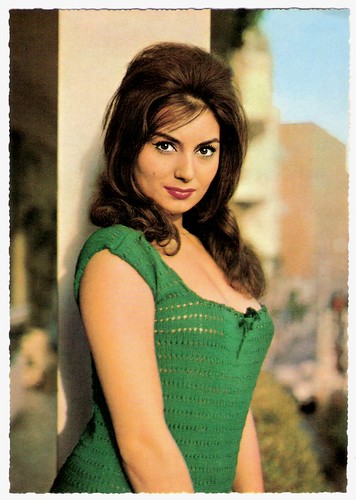
German postcard by Krüger.
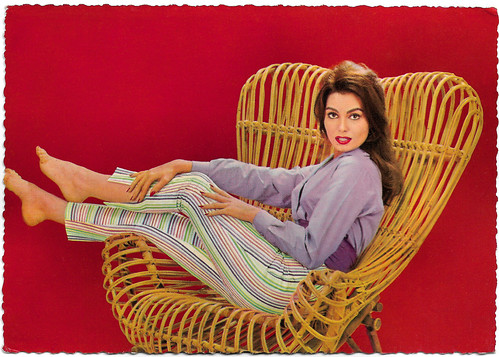
German postcard by Kruger, no. 902/114. Photo: Farabola.
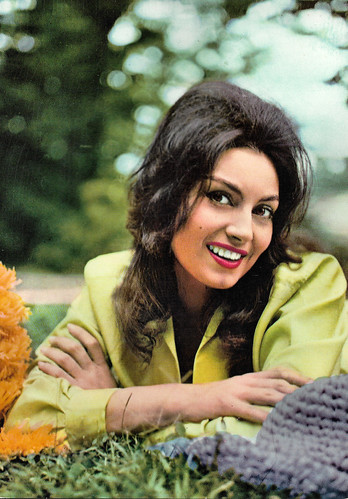
Italian postcard by Rotalfoto, Milano, no. N. 125.
Rosanna Schiaffino was born as Rosa Anna Schiaffino in Genoa, Liguria, into a well-off, non-show business family. Her sister later became actress Maria Pia Schiaffino.
When she was 14 she won the Miss Liguria beauty contest. The resulting photographs aroused the interest of film producers. Without her father's blessing but chaperoned by her mother and sister, Rosanna travelled to Rome for a screen test.
From 1956 onward, she was seen in earthy, sexy roles like in the Totò comedy Totò, lascia o raddoppia? (Camillo Mastrocinque, 1956), and the drama La Sfida/The Challenge (Francesco Rosi, 1958). The latter was well received at the 1958 Venice festival, where Schiaffino was much admired for her powerful but sensitive performance as a Neapolitan girl, inspired by a real-life character. On the day of her wedding to the young man with whom she has been having a passionate affair (José Suarez), he is killed by the Camorra, which he has been trying, ingenuously, to outwit for control of the fruit market.
She became famous for her eye-catching legs, and her temperamental performances. Her photographs graced covers of magazines in countries where her minor films were not even released. So she started with playing small parts, but by the end of the 1950s she had become a leading lady in Italian and French films, and later also in British and Hollywood productions.
In 1959 Schiaffino put her career in a higher gear with La Notte Brava/Bad Girls Don't Cry (Mauro Bolognini, 1959), an enjoyable tale of young people in an urban slum. The cast was full of attractive starlets like Elsa Martinelli, Mylène Demongeot, Antonella Lualdi, and Rosanna, showing her sexy legs on high heels. It was one of the first films co-scripted by Pier Paolo Pasolini.
Though not an actress of any great depth, she managed to land the dual role of the sacrificial virgin Ariadne and the evil princess Phaedra in Teseo Contro Il Minotauro/The Minotaur (Silvio Amadio, 1961). This sword-and-sandal epic meant her international breakthrough. Till the mid 1960s she would be busy on the international scene.
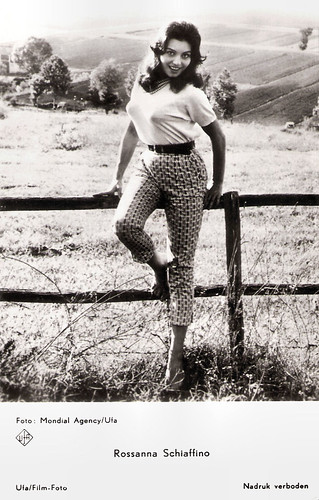
Dutch postcard by Gebr. Spanjersberg N.V., Rotterdam, no. 4802. Photo: Mondial Agency / Ufa.
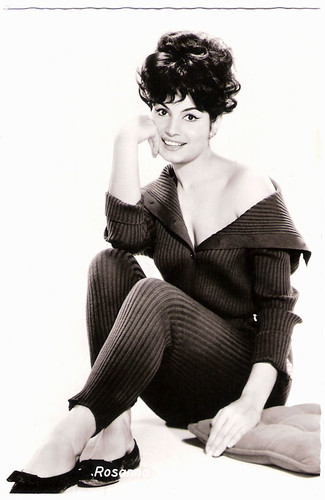
German postcard by Kolibri / Friedrich W. Sander-Verlag, Minden/Westf., no. 1699.
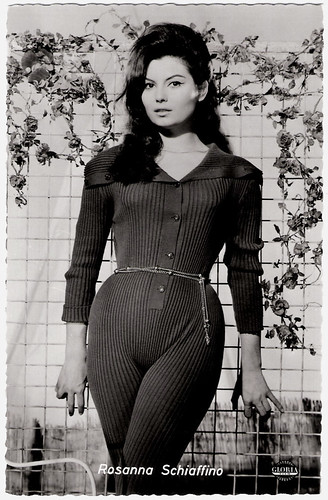
German postcard by Kolibri-Verlag, no. 1789. Photo: Arthur Grimm / CCC / Gloria.
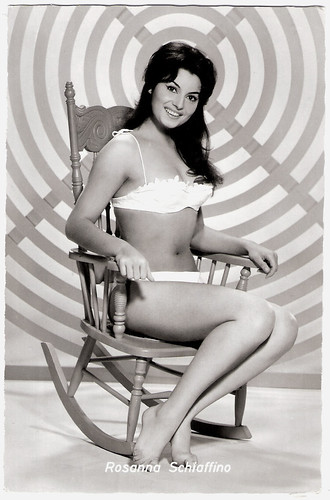
German postcard by Kolibri / Friedrich W. Sander-Verlag, Minden/Westf., no. 2563.
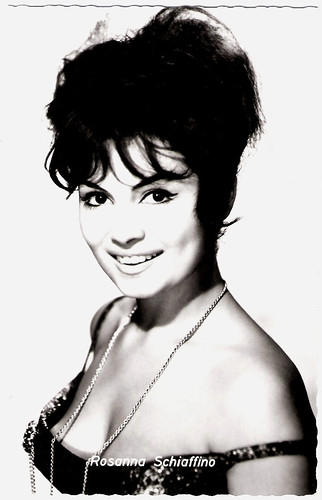
German postcard by Kolibri / Friedrich W. Sander-Verlag, Minden/Westf., no. 1622.
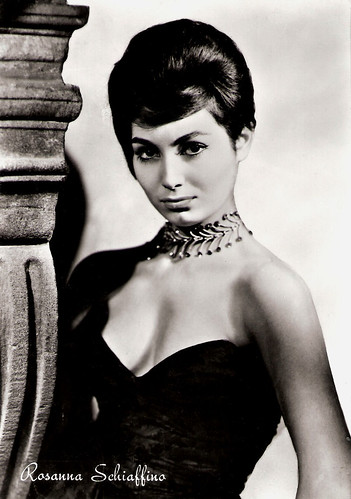
Italian postcard by Rotalfoto, no. 941.
After Franco Cristaldi focused on his didcovery Claudia Cardinale, Rosanna Schiaffino found another producer interested in her career, Alfredo Bini, whom she would marry in 1963.
In Bini's production RoGoPaG (named after its four directors, Roberto Rossellini, Jean-Luc Godard, Pasolini and Ugo Gregoretti, 1963), Schiaffino showed her mettle in Rossellini's Illibatezza/Chastity. John Francis Lane in The Guardian: "She gave credibility and humour to the role of an air hostess who succeeds in shaking off the advances of an American PR guy looking for the perfect chaste girl for an advertising campaign, by turning herself into a vampish glamourpuss."
Rosanna Schiaffino was a pleasing appearance in contemporary costumes in English language films like Two Weeks in Another Town (Vincente Minnelli, 1962) as a very temperamental film star, and in the war drama The Victors (Carl Foreman, 1963).
Schiaffino was even more fun to watch in her form-fitting period garb as the mistress of villainous Moroccan chieftain Sidney Poitier in The Long Ships (Jack Cardiff, 1964).
She also worked in Italian films like La Corruzione/Corruption (Mauro Bolognini, 1963), the episode film Ro.Go.Pa.G./Let’s Have a Brainwash (Roberto Rossellini, 1963), Sette contro la morte/The Cavern (Edgar G. Ulmer, 1964).
Next she appeared in the amusing costume comedy La Mandragola/The Mandrake (Alberto Lattuada, 1965), La Strega in amore/The Witch in Love (Damiano Damiani, 1966), and the biopic Simón Bolívar (Alessandro Blasetti, 1969) opposite Maximilian Schell.
Despite the increase of nudity in films at the end of the 1960s, Schiaffino refused to appear in such scenes. In the 1970s she played leading parts in comedies, Spaghetti Westerns and thrillers by minor directors that have all been forgotten. Obviously her career petered out. In 1976 she decided to give up the cinema.
Rosanna Schiaffino was married twice. In 1977 she divorced producer Alfredo Bini, with whom she had a daughter, Antonella. During the summer of 1980, in Portofino, she met the playboy and steel industry heir Giorgio Falck. Their affair was big news for the gossip tabloids. In 1981 she gave birth to their son, Guido, and in 1982 she married Falck. She and Falck had a son, Guido, but they divorced in 2001.
In 1991, she was diagnosed with breast cancer. Rosanna Schiaffino died in Milan, Italy in 2009. She was 69.
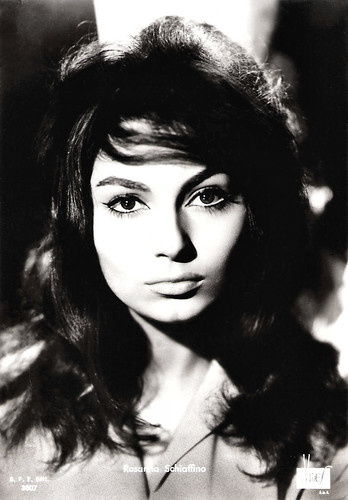
Italian postcard by Casa Editrice Ballerini & Fratini, Firenze, no. 3807. Photo: Vides. Publicity still for La Sfida/The Challenge (Francesco Rosi, 1958).
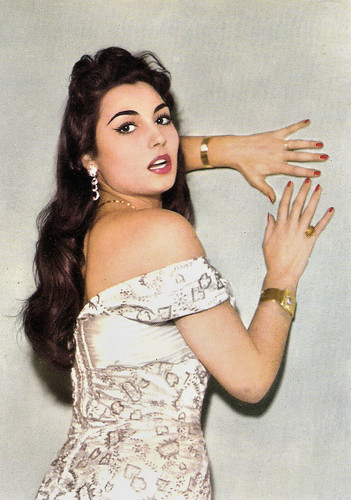
Italian postcard by Rotalfoto, Milano, no. N 77.
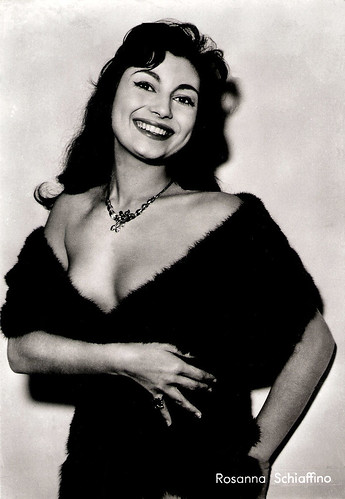
Italian postcard, no. 140.
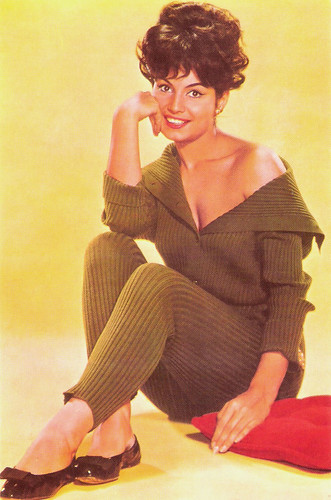
Romanian postcard by Casa Filmului Acin.
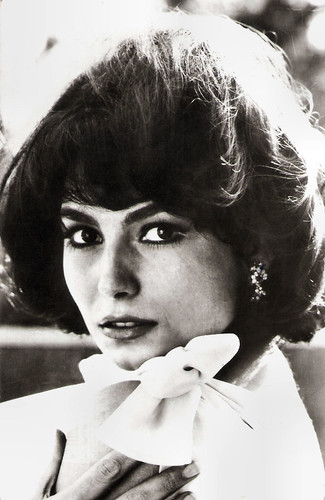
Romanian postcard by Casa Filmului Acin, no. 411.
Trailer of The Man Called Noon (Peter Collinson, 1973). Source: Ady Black (YouTube).
Sources: John Francis Lane (The Guardian), AllMovie, Wikipedia and IMDb.

German postcard by Ufa, no. CK 421. Photo: Georg Michalke.

German postcard by Krüger, no. 902/59.

German postcard by Krüger.

German postcard by Kruger, no. 902/114. Photo: Farabola.

Italian postcard by Rotalfoto, Milano, no. N. 125.
Sacrificial Virgin and Evil Princess
Rosanna Schiaffino was born as Rosa Anna Schiaffino in Genoa, Liguria, into a well-off, non-show business family. Her sister later became actress Maria Pia Schiaffino.
When she was 14 she won the Miss Liguria beauty contest. The resulting photographs aroused the interest of film producers. Without her father's blessing but chaperoned by her mother and sister, Rosanna travelled to Rome for a screen test.
From 1956 onward, she was seen in earthy, sexy roles like in the Totò comedy Totò, lascia o raddoppia? (Camillo Mastrocinque, 1956), and the drama La Sfida/The Challenge (Francesco Rosi, 1958). The latter was well received at the 1958 Venice festival, where Schiaffino was much admired for her powerful but sensitive performance as a Neapolitan girl, inspired by a real-life character. On the day of her wedding to the young man with whom she has been having a passionate affair (José Suarez), he is killed by the Camorra, which he has been trying, ingenuously, to outwit for control of the fruit market.
She became famous for her eye-catching legs, and her temperamental performances. Her photographs graced covers of magazines in countries where her minor films were not even released. So she started with playing small parts, but by the end of the 1950s she had become a leading lady in Italian and French films, and later also in British and Hollywood productions.
In 1959 Schiaffino put her career in a higher gear with La Notte Brava/Bad Girls Don't Cry (Mauro Bolognini, 1959), an enjoyable tale of young people in an urban slum. The cast was full of attractive starlets like Elsa Martinelli, Mylène Demongeot, Antonella Lualdi, and Rosanna, showing her sexy legs on high heels. It was one of the first films co-scripted by Pier Paolo Pasolini.
Though not an actress of any great depth, she managed to land the dual role of the sacrificial virgin Ariadne and the evil princess Phaedra in Teseo Contro Il Minotauro/The Minotaur (Silvio Amadio, 1961). This sword-and-sandal epic meant her international breakthrough. Till the mid 1960s she would be busy on the international scene.

Dutch postcard by Gebr. Spanjersberg N.V., Rotterdam, no. 4802. Photo: Mondial Agency / Ufa.

German postcard by Kolibri / Friedrich W. Sander-Verlag, Minden/Westf., no. 1699.

German postcard by Kolibri-Verlag, no. 1789. Photo: Arthur Grimm / CCC / Gloria.

German postcard by Kolibri / Friedrich W. Sander-Verlag, Minden/Westf., no. 2563.

German postcard by Kolibri / Friedrich W. Sander-Verlag, Minden/Westf., no. 1622.

Italian postcard by Rotalfoto, no. 941.
Form-fitting Period Garb
After Franco Cristaldi focused on his didcovery Claudia Cardinale, Rosanna Schiaffino found another producer interested in her career, Alfredo Bini, whom she would marry in 1963.
In Bini's production RoGoPaG (named after its four directors, Roberto Rossellini, Jean-Luc Godard, Pasolini and Ugo Gregoretti, 1963), Schiaffino showed her mettle in Rossellini's Illibatezza/Chastity. John Francis Lane in The Guardian: "She gave credibility and humour to the role of an air hostess who succeeds in shaking off the advances of an American PR guy looking for the perfect chaste girl for an advertising campaign, by turning herself into a vampish glamourpuss."
Rosanna Schiaffino was a pleasing appearance in contemporary costumes in English language films like Two Weeks in Another Town (Vincente Minnelli, 1962) as a very temperamental film star, and in the war drama The Victors (Carl Foreman, 1963).
Schiaffino was even more fun to watch in her form-fitting period garb as the mistress of villainous Moroccan chieftain Sidney Poitier in The Long Ships (Jack Cardiff, 1964).
She also worked in Italian films like La Corruzione/Corruption (Mauro Bolognini, 1963), the episode film Ro.Go.Pa.G./Let’s Have a Brainwash (Roberto Rossellini, 1963), Sette contro la morte/The Cavern (Edgar G. Ulmer, 1964).
Next she appeared in the amusing costume comedy La Mandragola/The Mandrake (Alberto Lattuada, 1965), La Strega in amore/The Witch in Love (Damiano Damiani, 1966), and the biopic Simón Bolívar (Alessandro Blasetti, 1969) opposite Maximilian Schell.
Despite the increase of nudity in films at the end of the 1960s, Schiaffino refused to appear in such scenes. In the 1970s she played leading parts in comedies, Spaghetti Westerns and thrillers by minor directors that have all been forgotten. Obviously her career petered out. In 1976 she decided to give up the cinema.
Rosanna Schiaffino was married twice. In 1977 she divorced producer Alfredo Bini, with whom she had a daughter, Antonella. During the summer of 1980, in Portofino, she met the playboy and steel industry heir Giorgio Falck. Their affair was big news for the gossip tabloids. In 1981 she gave birth to their son, Guido, and in 1982 she married Falck. She and Falck had a son, Guido, but they divorced in 2001.
In 1991, she was diagnosed with breast cancer. Rosanna Schiaffino died in Milan, Italy in 2009. She was 69.

Italian postcard by Casa Editrice Ballerini & Fratini, Firenze, no. 3807. Photo: Vides. Publicity still for La Sfida/The Challenge (Francesco Rosi, 1958).

Italian postcard by Rotalfoto, Milano, no. N 77.

Italian postcard, no. 140.

Romanian postcard by Casa Filmului Acin.

Romanian postcard by Casa Filmului Acin, no. 411.
Trailer of The Man Called Noon (Peter Collinson, 1973). Source: Ady Black (YouTube).
Sources: John Francis Lane (The Guardian), AllMovie, Wikipedia and IMDb.
Rosanna Schiaffino died of cancer after a grueling, long illness on 17 October 2009, aged 69.
ReplyDelete